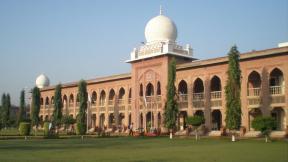
In a complacent world, instituting an Islamic education in the hope of revitalizing the Deen (religion) seems to be a lofty ideal rather than a realistic possibility, but given the proper tutelage and an appropriately executed course of action for educators, this concept could very well realize its potential.
First, the attributes of a Muslim educator and education should be outlined. One should not categorize an educator as simply one who has attained a degree in a given course of study - one should view all Muslims as educators in their own right. Education should not be limited, therefore, to instruction within the walls of a classroom. Education comprises a lifelong endeavor, and it is the duty of all Muslims to learn from and to teach one another reciprocally. A three- fold path toward implementing an Islamic education outside the realm of classroom instruction includes: leading by example, applying Islamic guidelines to modernity, and discussing among peers of a similar persuasion.
Arguably most important, leading by example is a concept that allows for improvement of the self while demonstrating to a fellow Muslim that living a fulfilling Islamic life is an advantageous reality rather than a disability. This first item does, however, require at least a rudimentary knowledge of the Quran and Sunnah, which leads to the second principle of comprehensive Islamic education.
Application in a modern context can help eliminate the notion that Islam is an historical relic that benefits only the antiquated university historian or the casual investigator. In fact, learning and acting upon the Quran and Sunnah facilitate the instruction and education of youth in a traditionally unIslamic society. The discussion of Shariah (Islamic law) and its implications relevant to the current issues of cloning, genetic engineering, etc. will advocate an increased knowledge of Islam and its relation to ethical conduct.
The third tenet relates to education in a cooperative learning sense. Discussion and mutual consultation can only help promote general knowledge of Islam and its ramifications with respect to contemporary issues.
Combined, this approach can help each Muslim reach his/her full potential as an educator regardless of age, race, or gender. And as a result, Muslims worldwide could help bring about the eventual re- invigoration of Islam as a global doctrine both of which would be accomplished by means of a passive yet intellectual renaissance among the youth of a confrontational yet potentially cohesive society.








Comments
education
Very nice
Location
Add new comment